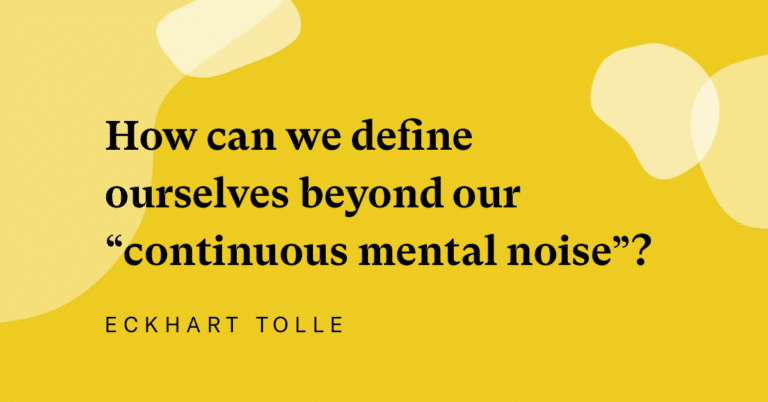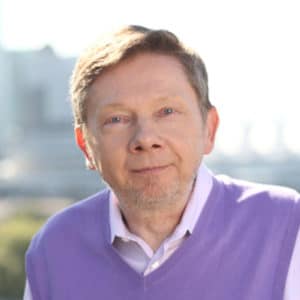Eckhart Tolle
Life Beyond the Mind
“There is a place inside me that is far more powerful than the continuous mental noise,” says Eckhart Tolle. The spiritual teacher began to gain attention with his 1997 book, The Power of Now. Millions of people around the world have found pragmatic tools in his vision that fundamentally complicates the notion, “I think, therefore I am.”

© All Rights Reserved.
Guest

Eckhart Tolle is a spiritual teacher and the best-selling author of A New Earth and The Power of Now.
Transcript
[music: “Sun Will Set” by Zoë Keating]
Krista Tippett, host: I’ve had hundreds of big conversations, and my conversation partners share wisdom I carry with me wherever I go. Eckhart Tolle began to gain attention with his 1997 book, The Power of Now. Millions of people around the world have found pragmatic tools in his vision that fundamentally complicates the notion, “I think, therefore I am.”
This is Becoming Wise. I’m Krista Tippett.
Ms. Tippett: You tell this story in A New Earth where you experienced a woman talking to herself on the train, right? On the tube train — tell that story — caught in her thoughts, and then you came to understand that you had some of the same problems.
Eckhart Tolle: Yes. I would sometimes see her on the train, and she would continuously talk to herself or to an imaginary person in a very angry voice, continuously complaining — “And then he did this to me, then he said, and I said — how dare he tell me this” — and I watched in amazement. How can anybody be so insane and still apparently have a job? Because she would catch the subway every morning.
Ms. Tippett: [laughs] She was going somewhere, right.
Mr. Tolle: And one day, I was washing my hands in the bathroom, and I thought, “My God. Her voice — she never stops talking.” And I suddenly realized, well, I do that, too, except that I don’t do it out loud. And then I thought, I hope I don’t end up like her. And somebody next to me looked at me, and I suddenly realized in shock that I had actually said these words aloud, just like her. I said, “I hope I don’t end up like her.” [laughs]
So I realized my mind was as incessantly active as hers. Our only difference was that my thought was mostly based on feeling sorry for myself. It was depressed kind of thinking. Her patterns were fueled by anger. It took years before I finally was able to really step out of the stream of thinking and realize, there is a place inside me that is far more powerful than the continuous mental noise with which for many, many years I had been completely identified, just like that woman.
Ms. Tippett: What happened to you when you were 29 to finally really jolt you out of that?
Mr. Tolle: I was in the depth of depression, and I lived in anxiety about my life and my problems and my future. One night I woke up again feeling this sense of dread, and a phrase came into my head, which said, “I can’t live with myself any longer. I can’t live with myself any longer.” And suddenly I was able to stand back and look at that phrase, and I thought, oh, that is strange. Who am I, and who is the self I cannot live with? Because there must be two of me here if that phrase is correct. There are two of me. The “I” was there, and the “me” that I couldn’t live with actually was the continuous mental noise, the stream of thinking that considered life and that considered myself as a problem.
Ms. Tippett: I wonder if it’s also — some aspect of that is that when you are fully alive and fully present, even if in a very powerful way — even if your presence is powerful — there’s something about knowing your place in the scheme of things, being aware of how complex and large everything around you is.
Mr. Tolle: Yes. The vastness of it all and the compulsion to continuously interpret whatever you are experiencing at any given moment — that is no longer there. There’s great freedom in not compulsively interpreting other people, situations, and so on, not imposing all these judgments. That’s another word for it. Imposing thinking continuously on the world, which is so alive and so fresh and new at every moment. And so, yes, the mind is beautiful, the ability to think is a great thing, and it does not mean you fall below thinking when you are open to the present moment in a state of …
Ms. Tippett: Or that you turn your mind off, right? It doesn’t …
Mr. Tolle: Yes. What we are talking about here is a state of alert attention to what is, where compulsive thinking no longer operates. This means you rise above thinking to a large extent in your life, where you can face life without the interference of the mind — still being able to use the mind when it’s needed, but not being used by it.
[music: “Sun Will Set” by Zoë Keating]
Ms. Tippett: My favorite book of Eckhart Tolle is The Power of Now. He’s also the author of the wildly bestselling A New Earth.
Becoming Wise is produced by Marie Sambilay, Lily Percy, and Chris Heagle at On Being Studios, which is located on Dakota Land. Our theme music is provided and composed by Zoë Keating.
Books & Music
Recommended Reading
The On Being Project is an affiliate partner of Bookshop.org and Amazon.com. Any earnings we receive through these affiliate partnerships go into directly supporting The On Being Project.







